
Publisher:
Bonnie King
CONTACT:
Newsroom@Salem-news.com
Advertising:
Adsales@Salem-news.com

~Truth~
~Justice~
~Peace~
TJP
Jun-24-2013 21:35

 TweetFollow @OregonNews
TweetFollow @OregonNews
Warm Reflections On The Cold War
Bill Annett Salem-News.comI strove with none, for none was worth the strife...
-Walter Savage Landor
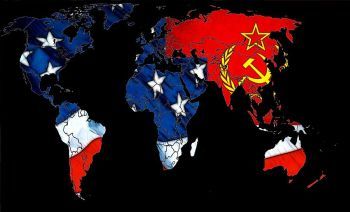 Cold War map credit: Stefan Kuhn reddit.com |
(DAYTONA BEACH, FL) - In the aftermath (sometimes known as algebra) of World War II, there followed a strange period known as “the cold war.” Nobody knows exactly why it
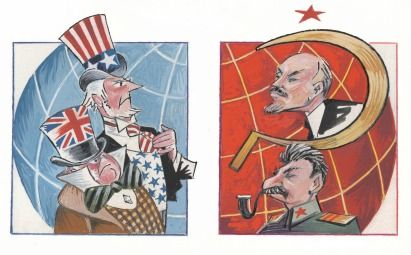 Courtesy: foreignaffairs.com |
From 1946 through the 1980s, the Cold War cast a shadow over every facet of American life. Yet, paradoxically, it also created possibilities. In an arms race that threatened all of humanity, could America afford to confine women to the kitchen, where there were no bomb shelters? These and other vexing questions were raised by thinking Americans. For unthinking Americans, it was a period of unprecedented prosperity.
Poverty was declared obsolete, especially by the Republican Party. The ultimate consumer society followed, until 50 years later when it became evident that we had been consuming too much. But we'll deal with obesity later.
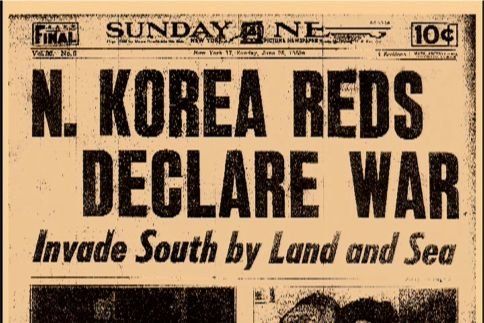 Courtesy: tomnichols.net |
The first hot battle in the cold war took place when North Korea, an invention of the State Department, provoked their southern counterparts, or perhaps vice-versa. This had been going on for centuries, but being from Missouri, Truman committed American troops to stop the spread of communism and later the threat of Chinese dog-food exports. Less than a year later, in April, 1951, Truman fired General Douglas MacArthur for doing exactly the same thing. Except, of course, that MacArthur wanted to invade China, because of the influence of his Japanese period, that is, his five year reign as honorary emperor.
Truman also sent $15 million (considered to be a lot of money at the time) as financial aid to the beleaguered French in Vietnam, who were having their horloges cleaned by Ho Chi Min at Dien Bien Phu. Truman also sent 35 military advisers to tell the French how to control the Vietnamese, but they arrived too late.
After the French had left, and so had Truman, President Lyndon Johnson authorized a further military buildup to prevent the Vietnamese from escalating military operations in their own country. A Vietnamese motor boat had already attacked an American destroyer in the Gulf Of Tonkin, so it was clear that they wanted to be top dog in their own Gulf. The American destroyer captain thought that Tonkin was Indian country and that we owned it, naturally. So the motor boat was clearly a pre-emptive strike.
The ensuing military action to protect Vietnam from Ho Chi Min took ten years or so, and cost 50,000 American lives. The war demonstrated why, although Vietnam had been continually invaded for more than 1,000 years by the Chinese, the Japanese, the French and possibly warlike Tibetans, none of the invaders were still around.
American troops also invaded Cambodia because you couldn't tell the difference between the Vietnamese and the Cambodians, except that Vietnamese food is a little less spicy and the Cambodians speak pidgin English and sometimes fractured French. (My favorite is “Tant pis, tant mieux," which means: “My Aunt has gone to the bathroom, and now she feels better.")
Later the American people expressed their gratitude to Truman by limiting him, and subsequent Presidents, to two terms. Roosevelt, by contrast, had taken the U.S. into a war that enlisted 20 million servicemen, for which he was granted four terms.
Two outstanding events occurred in 1953: Dwight Eisenhower, who had given the Russians many things, including Berlin, was inaugurated as the 34th President, and at the same time Julius and Ethel Rosenberg were executed for giving military information to the Russians. The Russians insisted that the Rosenbergss had merely handed over a secret recipe for borscht with an egg. If you've ever tasted borscht, you'll probably agree that the death penalty was not too harsh.
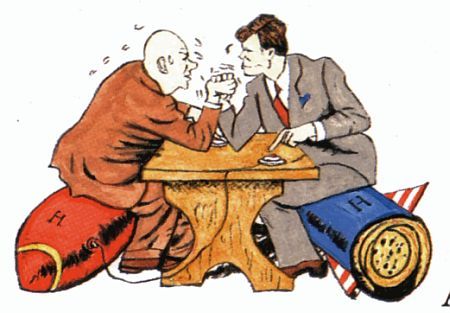 Courtesy: talkandroid.com |
In 1962, two things of note happened. John Glenn became the first American to orbit the earth, getting even with the Russians, and in the same year President Kennedy imposed a naval blockade on Cuba to force the USSR to remove its missile bases.
As for the American missile bases surrounding the USSR, Kennedy said: “That's different. Our bases defend you against aggressive Middle Eastern Powers, such as Yemen and Kuwait. Ask not what you can do to America; consider what America can do to you.”
The Marshall Plan had already succeeded in rebuilding Germany and lowering trade barriers. The Truman Doctrine now blocked communist expansion in the Balkans and raised trade barriers.
The policy of launching a massive nuclear attack, knowing a massive nuclear counterattack would follow, was known as mutually assured destruction (MAD). Instead, America and the USSR resorted to “Always the bridesmaid” wars, as in Korea and Vietnam, which didn't fool anybody, least of all the Vietnamese.
In 1961, first the Russians put a dog into space, then the first man and finally were first to orbit the earth. To get even, America put two men on the moon in 1969, just as Kennedy had said they would.
At the same time, American culture was spreading around the world, thanks to technology. We exported Hollywood, rock and roll, fast food and big-box stores, and got back British humor, the Beatles, pizza, Japanese cars and Chinese dog food. Or as economists call it, an adverse balance of trade.
There followed a world-wide economic boom that was climaxed by the collapse of the Soviet Union and the rise of the Russian oil Mafia and other market-based economies.
Women obtained equal rights in many parts of the world and most societies accepted equal rights for minorities, except for indigenous people, who only accounted for about 400 million, and were n good at lobbying.
Other minor events in the latter half of the 20th Century included the formation of the State of Israel, the implosion of the British Empire and the disintegration of the USSR. In biology, the structure of human DNA was first determined in 1953, with the initial result that there were fewer inmates on death row, and accordingly an increase in murders in the streets.
Medical science progressed rapidly. A vaccine was developed for swine flu and a swine or two in the Federal government, encouraged by the Center for Disease Control (CDC) and the World Health Organization (WHO), made millions as a reward for making billions for the pharmaceutical industry (PI).
On the other side of the ledger, the mushrooming of vitamins (and the vitaminizing of mushrooms) eliminated scurvy - an especial boon to English sailors in what remained of the Royal Navy's sailing vessels. The discovery that lung cancer was the result of smoking stimulated a bull market in tobacco stocks, over which most governments spent millions advertising the deadly effects of the habit, almost as much as they received in revenue from tobacco tax.
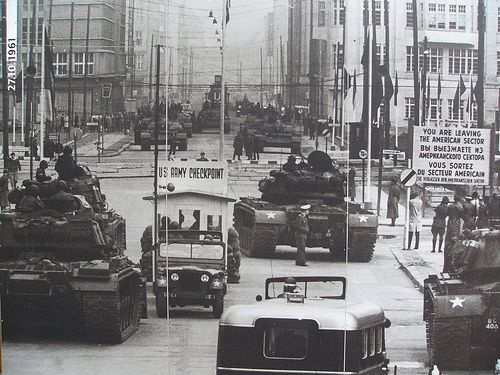 Courtesy: philebersole.wordpress.com |
Drugs such as cocaine and LSD were also discovered in the late 20th Century, and it was decided that they should be outlawed, much to the delight of outlaws, because it resulted in an immediate skyrocketing of the price, the expansion of regulatory and investigative organizations, and of course the Mafia.
Among the other great advances in the Cold War period, our fossil fuel consumption ranks as one of the most significant. It resulted in almost continuous war in the Middle East, prompted by countries in the Far West. Universal use of petroleum and petrochemical products as fuel for automobiles and airplanes led to the marvels of road travel, flight, geopolitical and military explosions - such as the bombing of Pearl Harbor and Hitler's invasion of the Ukraine - the toxification of the atmosphere and the destruction of the earth's environment and ecology as we know it.
By the end of the century, Europe had obtained a sustainable state of peace, although in a state of economic dissolution, the Indian sub-continent had achieved indigenous independence for the first time in centuries, although much of its population was either starving or considered untouchable, China - with a fifth of the world's population - which had been an ancient nation, bullied by every modern country since its discovery - had now assumed its place as a world economic leader, although its people were still subject to a total lack of human rights, and finally, in Africa, another billion people had forged new nation states, not a few of them ruled over by genocidal bandits who profited by the technological advancement in weaponry provided by the rest of the world.
It was time to pause and take stock of mankind's superhuman advancement.
Start without me. Shortly after I converted my bomb shelter to a jacuzzi, it was flooded during Hurricane Charley.
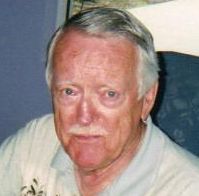
Bill Annett grew up a writing brat; his father, Ross Annett, at a time when Scott Fitzgerald and P.G. Wodehouse were regular contributors, wrote the longest series of short stories in the Saturday Evening Post's history, with the sole exception of the unsinkable Tugboat Annie.
At 18, Bill's first short story was included in the anthology “Canadian Short Stories.” Alarmed, his father enrolled Bill in law school in Manitoba to ensure his going straight. For a time, it worked, although Bill did an arabesque into an English major, followed, logically, by corporation finance, investment banking and business administration at NYU and the Wharton School. He added G.I. education in the Army's CID at Fort Dix, New Jersey during the Korean altercation.
He also contributed to The American Banker and Venture in New York, INC. in Boston, the International Mining Journal in London, Hong Kong Business, Financial Times and Financial Post in Toronto.
Bill has written six books, including a page-turner on mutual funds, a send-up on the securities industry, three corporate histories and a novel, the latter no doubt inspired by his current occupation in Daytona Beach as a law-abiding beach comber.
You can write to Bill Annett at this address: hoople84@gmail.com.
 |
 |
 |
Articles for June 23, 2013 | Articles for June 24, 2013 | Articles for June 25, 2013



Quick Links
DINING
Willamette UniversityGoudy Commons Cafe
Dine on the Queen
Willamette Queen Sternwheeler
MUST SEE SALEM
Oregon Capitol ToursCapitol History Gateway
Willamette River Ride
Willamette Queen Sternwheeler
Historic Home Tours:
Deepwood Museum
The Bush House
Gaiety Hollow Garden
AUCTIONS - APPRAISALS
Auction Masters & AppraisalsCONSTRUCTION SERVICES
Roofing and ContractingSheridan, Ore.
ONLINE SHOPPING
Special Occasion DressesAdvertise with Salem-News
Contact:AdSales@Salem-News.com

Terms of Service | Privacy Policy
All comments and messages are approved by people and self promotional links or unacceptable comments are denied.
[Return to Top]
©2025 Salem-News.com. All opinions expressed in this article are those of the author and do not necessarily reflect those of Salem-News.com.